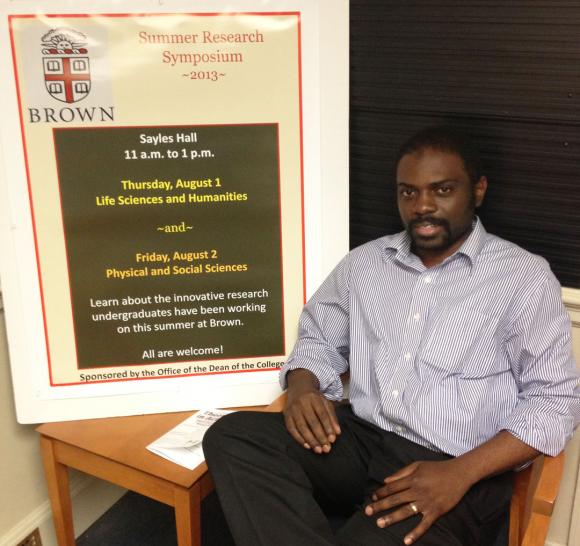About 200 undergraduates from Brown and other universities are gathering in Sayles Hall Thursday and Friday, Aug. 1 and 2, 2013, for the 2013 Summer Research Symposium. Students will present posters describing the work they have done over the last 10 weeks in humanities and the life, physical, and social sciences. Over the last decade, participation in the symposium has increased by around 60 percent, according to Oludurotimi Adetunji, assistant dean of the College, who oversaw the organization of the symposium this year.
Adetunji, who directs Brown’s Undergraduate Teaching and Research Awards program, talked with Kevin Stacey about the importance of undergraduate research at Brown.
Who will be participating in the symposium?
The Summer Research Symposium allows all undergraduate students who have conducted research or innovative curricular work at Brown this summer to present their work to a broad audience. The great majority of these students attend Brown, but we also have a number of visiting students whose research is sponsored by various external organizations, such as the Leadership Alliance. This year we’re expecting about 200 students to present and many of their faculty sponsors will attend as well. The whole idea is to give undergraduate students an opportunity to share their data and the work that they’ve done over the last 10 weeks with a broad audience.
How do students get involved in summer research?
Brown prides itself on supporting undergraduate student research. There are a number of ways students can get involved. First, they need to have some kind of funding. At Brown, the lead funder is the UTRA program, the Karen T. Romer Undergraduate Teaching and Research Awards. Students apply for awards in the spring for the following summer. They have to define a project they’re interested in, find a faculty member with whom to collaborate, and submit their application.
In addition to UTRA, there are other funding sources as well — the Howard Hughes Medical Institute, the Leadership Alliance, the Royce Fellowship, the Voss Environmental Fellowship, the Mellon Mays Fellowship and others. Information sessions about these fellowships and how students can apply are usually held during the spring semester. The event locations are usually announced via Brown Morning Mail, listserv, as well by flyers posted across campus.
How do faculty participate?
Hundreds of Brown faculty members have volunteered their time to mentor students during the summer months. Such service exemplifies Brown faculty’s dedication to undergraduate teaching. For the UTRA program, faculty members can identify a student they feel is really doing good work and form a collaboration that way. Alternatively, a student interested in a faculty member’s research or classes could ask that faculty member to be a collaborator. We stress collaboration between students and faculty. We want the student to benefit from the mentorship of a faculty member.
What’s the breadth of research we expect to see at the symposium?
The symposium happens over two days. Thursday, we’ll have students from the humanities and life sciences. On Friday we’ll have students from physical and social sciences present their work. There will be a wide variety of work presented over those two days — energy-related research, brain-related research, a project on how to preserve the Rome’s cultural heritage in the digital age, a project on children’s learning and socialization, and a study on health care access for refugee families in Providence. The diversity of poster presentations illustrates the wide-ranging opportunities students and faculty have to work together to produce new knowledge.
The symposium also includes innovative curriculum projects. Those presentations will be by students who are helping faculty to design new curricula or to redesign a course. This gives an opportunity for them to present as well.
Why is it important for students to do research as undergraduates?
For many students, this might be their first experience in a lab. It gives them the flavor of how to be a good researcher, how to think critically. It also helps them to determine whether the field that they have chosen is the right one for them.
For students who intend to go to grad school, getting into a program is extremely competitive. If you don’t have research experience, your chances of being accepted to grad school are lower. So if a student has done research, it gives them a boost — especially if they’re able to get a publication out of it before they graduate.
However, research isn’t just for students thinking of grad school. Research is for all students. No matter what they do, research helps them to be able to think critically or analyze data or a piece of literature. These are tools that are needed in any profession, so it definitely looks good on a resume to have some background in research.

